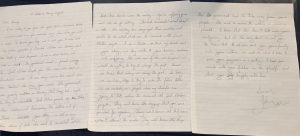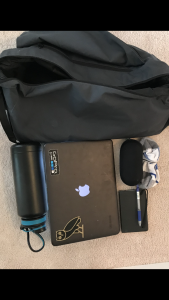Hello everyone! I used speechnotes.co and did my best to tell the story with some effort in using the grammtical functions. Pretty neat website. Enjoy!
So I want to tell you the story of my first-ever teacher in the Vancouver School Board. It was back in the early weeks of December of 2011 I just got hired as a substitute teacher and I was only 27 at the time. Tucker beathard of something (On my third day of subbing) I got called into a grade 6/7 classroom and the job was mandarin bilingual. I do speak Mandarin as I was born in Taiwan and grew up speaking it with my family. However, I was apprehensive about taking this position as I wasn’t confident ability to teach Mandarin. The reason I took it was because the job stated that this gig was only supposed to be for one week. Upon arriving at the class, I was informed that the teacher I was subbing for got into a pretty bad car (accident) and that I would be there until Christmas break. As I started teaching this class as (I) soon found out the Mandarin portion of the job wasn’t going to be the most challenging. It was one student named Malachi could (who would) create every single problem imaginable for me as a young teacher. Malachi is the quintessential Troublemaker student with a tough home situation. He has any (an) Oppositional Defiant Disorder and does everything he can possibly do to defy authority and Pusha (push a) teachers (teacher’s) buttons. Here are some of my memories of Malachi. On my first day teaching this class, he and another boy were kicking each other in the hallway for fun. I told them, quotation mark (“) you too save the Taekwondo for after school and not in the hallway (“). Malachi looks at me and says, (“) Hey! I’m half Korean and you’re being racist for saying that I do Taekwondo just because I’m Korean. I’m going to tell the principal and get you fired! I take a deep breath, and I say to him, this is my first day so I had no idea you are half Korean, I was simply trying to tell you to stop kicking each other in the hallways. If you’d like we can walk to the principal’s office together we can talk to her about how you’re kicking another student and threatening to get a teacher fired. I think I called his bluff pretty well and he back down immediately. Thank goodness I have experience dealing with little smart allan (alec) kids as I have nieces and nephews who like to talk back. Of course that wouldn’t be the end of Malachi’s attempts to push my buttons. Malachi once raised his hand in the middle of a lesson and said, (“) hey mr. Wu, do you know what my favourite holiday is? 911 (as he is referring to the terrorist attack of September 11th 2001, 4 years before when he was born close parenthesis). Another time Malachi placed a cutting mat under his shirt and then took an exacto knife, stood on top of a table and proclaimed i’m going to kill myself! Which he then proceeds to stabs himself in the chest with a cutting mat underneath. I at the time, danish note (didn’t know) there was a cutting mat there and the look on my face was beyond exasperated! I think he really enjoyed that one. Often times, he would finish quizzes, then shove them in his desk, and claimed that he handed it in and blame me for losing his quizzes. I would find them in his desk to find them full of scribbles and swear words. I spent everyday after school with the principal as she would mentor me patiently and teach me how to deal with this very special young man. The principal was very well aware the kind of student Malachi was, and the needs he had in the classroom. Every teacher in the school would ask me daily with a concerned face, how are you doing today with Malachi? Hang in there. If you think that I only had to deal with this student and class for two weeks, you’re mistaken as the teacher who had to take time off suffered greatly car accident and I ended up finishing the school year all the way to June with this class. It was actually one of the greatest teaching experiences of my life, I built a rapport and connection with the students of that that I will remember for a lifetime and I think I had a positive impact on them as well. Teaching Mandarin was a challenge. I stayed after school everyday brushing up on my Mandarin wow (while) trying to survive the rigours of teaching grade 7 full-time.The point of my story is not to vent about one troubling student I had 7 years ago, but it is actually to express my gratitude to have had this experience. I learned more about classroom management in those six months then I probably would have if I taught 3 years of classes without students like Malachi. To me, he was the extreme of all extreme students. He required a patient energy, relentless attention 2 (to) holding him too (to) high expectations, and a consistent execution of fair consequences. My Success with Malachi income (didn’t cme) in a straight line, but more so in a trial and error zig zag. Malachi was brutally honest, astutely observational, and clever beyond his years. He was simply a kid that needed very clear boundaries. In the Years following not (that) class, my ability to deal with students who caused trouble in a class we’re (were) finally (finely) polished because of Malachi. For not (that), I am truly thankful.
My analysis:
It was an interesting experience dictating this story through a speech to text program. I definitely tried to slow down and take my time to eliminate any “umms and ahhs”. If I had a chance to script this story, I would plan segments so that I could start new paragraphs. Speaking from the top of my head without a plan did not allow me to find natural pauses in the story which led to one long paragraph. The most common mistakes in the text were the program’s inability to clearly distinguish a few things I was saying which led me to have to go back and write in parentheses after the mistake. Furthermore, It didn’t have the ability to write quotation marks so that in the parts of my story that required them, I had to just speak right through. I considered them “mistakes” for two reasons. Grammatical errors are mistakes due to the fact that I like to follow the proper writing conventions I have learned over a lifetime in education. The mis-transcribed words are mistakes as they alter the meaning of the sentence. I found that oral story-telling differs from written story telling as you simply don’t pay attention to the conventions of writing in oral story-telling. The main focus is to get your points across in a manner where you can keep the audience’s attention. Oral story telling makes the assumption that the listener can process the implicitly built in conventions of grammar, spelling and context from the spoken words. For example, as I said in my story that I needed to pay “relentless attention 2 (to) holding him to a high expectation”, Oral story telling assumes that the listener will process that 2 into a to due to the context. The same thing would happen with “student’s memories, that the ‘s’ sound would imply the possessive aspect of the student. In written story telling, one does not have the convenience of that assumption and every convention of writing needs to be corrected in order to present a smooth reading experience.



